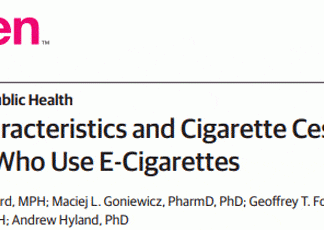
A new study published on August 1st 2024 looked for evidence that vaping helps people stop smoking.

The study is titled “E-cigarette Characteristics and Cigarette Cessation Among Adults Who Use E-cigarettes” and you can find it here.
I will just summarise the study below but you can always click the link above to read the details!
Introduction
I will simply copy and paste here the aim of this study…
“The purpose of this study was to evaluate in the US adult population of people who smoke cigarettes and use e-cigarettes whether there were associations between e-cigarette characteristics and cigarette cessation behaviors. Specifically, among adults who used e-cigarettes and smoked cigarettes daily, we evaluated associations of e-cigarette use frequency, e-cigarette flavor, e-cigarette device type, and year of data collection (a proxy for the evolving e-cigarette marketplace) with attempting to quit cigarette smoking, cigarette cessation among individuals who attempted to quit, and cigarette discontinuation (ie, the overall transition to no cigarette smoking regardless of making a quit attempt).”
Method
The data was taken from the PATH (Population Assessment of Tobacco and Health) study which is a long running study which began in 2013.
1985 adult responses were studied who smoked cigarettes daily and used vapes in the past 30 days in adjacent periods of the study.

At each interview participants were questioned on e-cigarette use and frequency. Also their current flavour preference was recorded.
Also the type of device was recorded – whether rechargeable and / or refillable.
In the next wave the respondents were quizzed on their smoking habits and whether they had attempted to quit smoking.
Results
As mentioned above there were 1985 adults studied who were over 21 years of age.

The main part of the study compared those who smoked and used e-cigarettes to quit and to follow the success rate.
It appeared those who used vapes daily were the most successful at stopping smoking, with a cessation rate of 39.1%. Those who used vapes but not daily had a cessation rate of 20.8%.
The flavour or type of vape did not impact these figures.
Conclusion
I will quote directly from the study below, these are some of the most important findings…
“This cohort study’s nationally representative findings show that daily use of e-cigarettes compared with nondaily use of e-cigarettes was consistently associated with greater cigarette cessation rates among adults who used e-cigarettes and attempted to quit smoking and with greater overall cigarette discontinuation rates, consistent with prior literature, although daily use of e-cigarettes was uncommon.
Furthermore, these findings align with research indicating that greater nicotine consumption from e-cigarette use increases the substitution potential of e-cigarettes for cigarettes.
However, it is also important to note that dual use of cigarettes and e-cigarettes has increased over time and that among people who dual use cigarettes and e-cigarettes, most individuals smoke cigarettes more frequently than they use e-cigarettes.
Furthermore, individuals who dual use remain exposed to cigarette smoking toxicants, making complete rather than partial substitution of cigarettes with e-cigarettes important for risk reduction.
Indeed, health care clinicians are now encouraged to discuss e-cigarettes as a cessation tool with patients who smoke cigarettes and have already tried FDA-approved cessation medications.”
“We also found that cigarette cessation rates were higher for adults who used e-cigarettes in 2019 to 2021 compared with those who used e-cigarettes before 2016 even after controlling for e-cigarette use frequency.
This finding is consistent with the hypothesis that newer-generation e-cigarettes that contain salt-based nicotine formulations with improved nicotine delivery are more effective for smoking cessation.
However, other factors may have contributed to the increased cessation rates observed across our study period; these factors may include the COVID-19 pandemic, with prior findings on the association of the COVID-19 pandemic with smoking cessation being mixed.”
